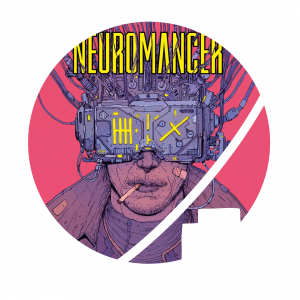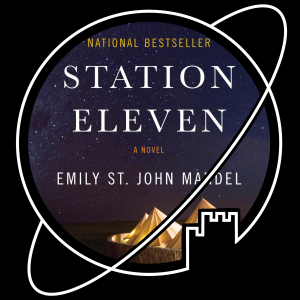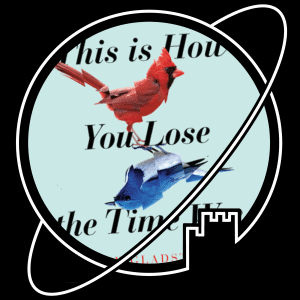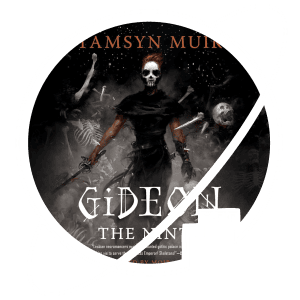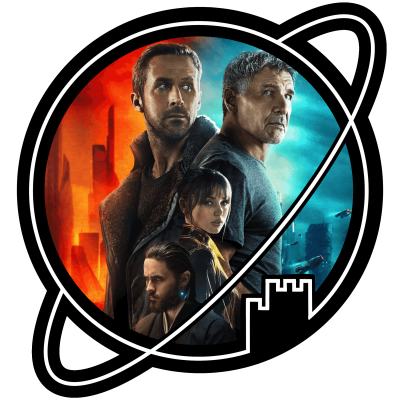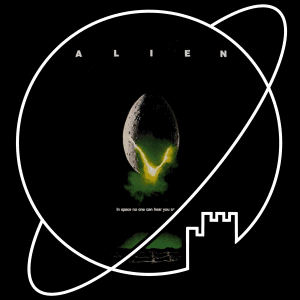Welcome to the Escape Velocity Collection!
We are an opinionated group of friends reviewing all sorts of fantasy and science fiction media. Don’t forget to get to know the curators and visit our curated Collection, where we discuss the stories that never cease to transport us to another world.
Will you escape with us?
LATEST POSTS:
- Novel written by Ken Liu
- Published 9 October 2025
- Apparently the first part of a planned series on Julia Z
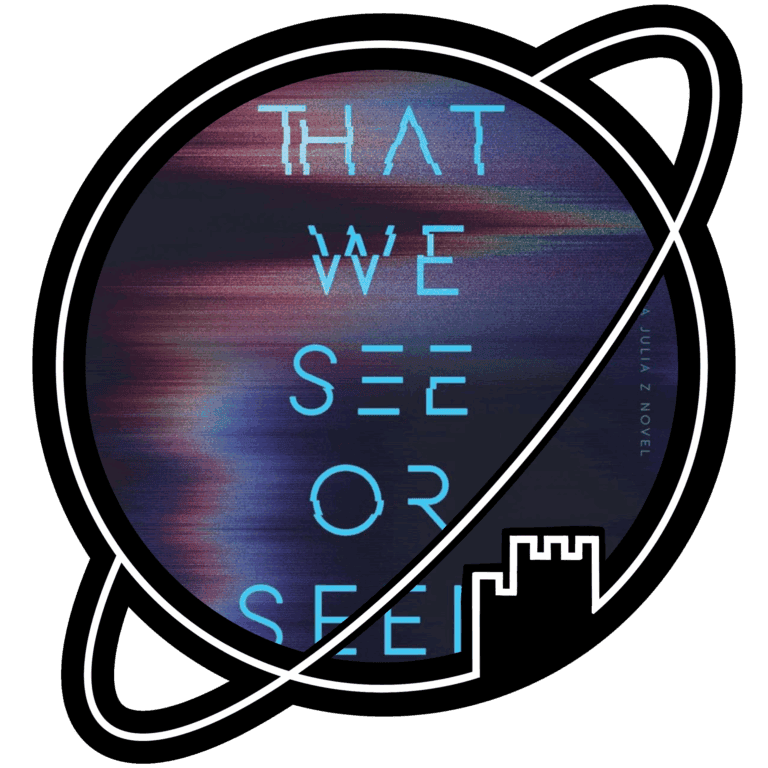

Listened to the audiobook with Kat Cleave – fine narrator.
I really liked The Paper Menagerie, so I was keen to try out some of Liu’s longer work. When The Grace of Kings disappointed, I chalked that up to the fact that it felt a little like an overreach – an attempt to squeeze an incredibly complex period in Chinese history into a fantasy setting. It read like Liu was trying just a little too hard to write a magnum opus. I figured that was a fluke and I was glad to find that Liu returned to sci fi for All that we See or Seem.
Only to find that his latest novel fell flat for me too.
The pitch is good, if a little generic – a loner with a skillset that wants to be forgotten by the world is pulled into One Last Case. The ‘twist’ here is that our loner is not a jaded, white, male, detective, but rather a young woman hacker.
Unfortunately, the story that spins from the prompt failed to excite me.
Part of the reason must be that the characters didn’t come alive. Perhaps the characters felt so flat because it appeared to me Liu was more excited about showing off his research into near future tech ideas than fleshing out his characters. Admittedly, there are a number of thought-provoking nuggets in his descriptions of technology. However, his dystopian vision of our near future – while not at all improbable – feels like it lacks imagination. And even though it hogs the limelight, frustratingly, it never feels like it is central to what is going on.
Liu’s focus on explaining the details of AI hacking or phone data tracking comes at the cost of developing, for example, his villain. Cartoonishly evil and without any form of motivation or background, his largest contribution to the novel are his phone calls to his equally generic goons.
The villain is not alone in this. My suspense of disbelief was thoroughly tested by a number of other moments that felt straight out of a cartoon. From improbable puzzles to listening in on the bad guys’ poorly scripted video game dialogue, from analysing company policy for determining what car to steal to analysing in what pot of food to hide one’s drone, All What We See or Seem is plagued by regular sections of underdeveloped prose that an editor should have taken an axe to.
Overall, All That We See or Seem is just the umpteenth cyberpunk noir that focusses on exploring a drab near-future dystopia over its own characters or message. My conclusion is that I should probably stick to Ken Liu’s short form fiction.
Tagged:
See also:
- Novel written by H.G. Wells
- Published in 1896
- Standalone


Listened to the audiobook with George Griffin – well read.
The Island of Dr Moreau is some of the very earliest works of science fiction ever, and honestly, it didn’t quite click for me.
The story is really simple: a cast away washes ashore on an island that is home to a race of strange human-animal hybrids, that turn out to be sutured together by a mad scientist that is trying to prove a point. When his influence over them wanes, they revert – some more slowly than others – to their animal nature, and the protagonist has to flee the island and get back to the world of men.
If I were brutally honest, I would say that that is a plot on the level of a children’s comic book.
Now, of course, the we should not forget that this novel was published in 1896. The mad scientist might have found his origin in The Island of Dr Moreau (to those of you who would accuse Victor Frankenstein of starting this trope instead, I challenge you to read the book!). So we need to cut Wells some slack.
But even with a lot of slack, I feel The Island of Dr Moreau doesn’t really rise much above the level of a simple adventure story.
Perhaps the idea of vivisecting and rebuilding animals the way Moreau does in this novel was an interesting or even vaguely plausible science fiction concept in 1896, but 130 years later it strikes the reader as rather fanciful.
The science fiction and the plot might be a little simple, but Wells wouldn’t be famous over a century down the line if he weren’t a good writer. There are certainly parts of The Island of Dr Moreau that prove that.
The best element of the story is probably the struggle of the beast-men to retain their human side. Made to be more than beasts, they are proud of their humanity and want to remain rational. But the moment their strict regime breaks down, they start reverting to their animal habits despite themselves.
I found that idea – that you may reshape an animal but that it will always revert to its nature – a sad but nevertheless thought-provoking message. It underlines Moreau’s hubris and his cruelty in making these animals something they are not.
In the end, I am happy to have crossed a classic like The Island of Dr Moreau off my list, but I am not sure this is a book that I would recommend to 21st century readers. A cornerstone of the genre, perhaps, but one best appreciated in its foundational role not examined individually.
- Novel written by Emily St. John Mandel
- Published 2022
- Standalone, loosely connected to The Glass Hotel
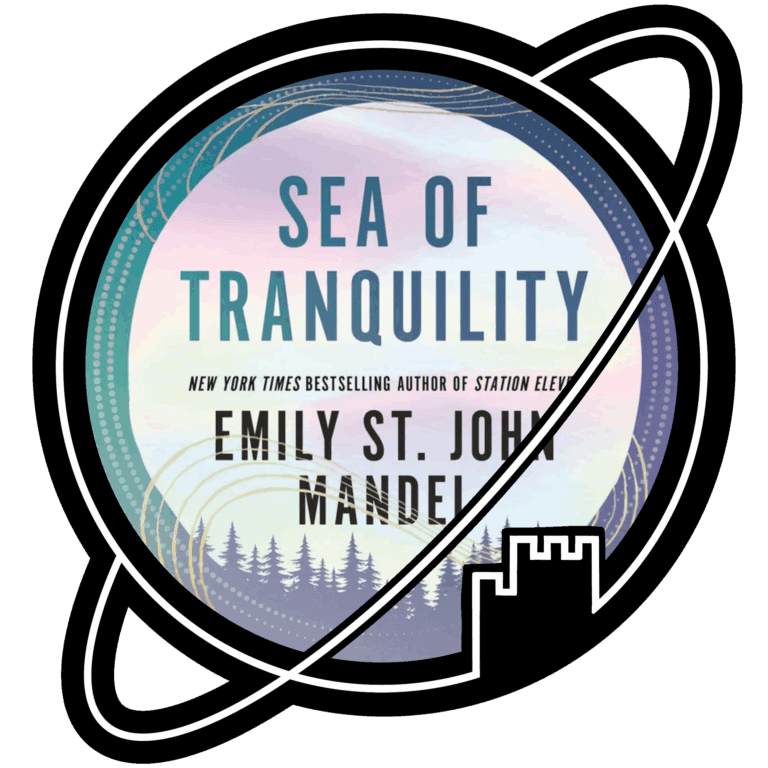

Listened to the full-cast audiobook with Kirsten Pitter, Arthur Morey, John Lee, and Dylan Moore. Well read, though perhaps this was not the book that was improved most by the full cast performance.
Borderline 2,5-3 stars. The bottom line of this review is that I did not not enjoy my time reading Sea of Tranquility but I also read it a couple of weeks ago and I already forgot that I did – I only remembered when I saw I noted it on my to review-list.
Sea of Tranquility is the kind of novel that I could have really loved. It has a time travel plot that is neatly slotted together (if not particularly sophisticated or unexpected), with interlinked and intertwined stories – that is the kind of book that tickles my fancy.
And there are other positives too – the book is character and emotion focussed and even though the separate stories mean that you don’t spend as much time with each of the characters as you might in another novel, I connected with them well. The prose is atmospheric, good at establishing a vibe in all the scenes.
On the other hand, it all remains pretty vague.
For example, the book takes place over different timelines and geographic locations, but I feel the effort to differentiate them fell a little flat. The one person we properly meet in 1912 happens to be the one who opposes colonialism, so we St John Mandel never really needs to portray a true denizen of the antebellum and get into their mindset. When we get to the 2200’s, the characters are still discussing sexism and the division of task in raising children between husband and wife.
I am not saying that those might not have been or might not be topics of discussion in those far away times, but it is obvious that these are discussions from today that are projected on distant characters with no apparent effort to place them in their (imagined) context.
The same goes for the small details of worldbuilding. Are people going to be doing a physical book tour selling physical books in the 2200s? Is it ever really going to be feasible to commute from the earth to the moon? Why are people traveling in time to begin with again?
All in all, the strongest sections of Sea of Tranquility are those taking place in the here and now, where the relatively mediocre sci-fi elements don’t get in the way of enjoying a good emotion-driven scene.
In conclusion, I am on the fence. At its best, Sea of Tranquility is a nice atmospheric and emotional drama, with a properly designed if a little cliché time-travel puzzle on top. At its worst, Sea of Tranquility is a poorly executed Cloud Atlas-clone that doesn’t get what makes that book so impressive. Make of that what you will.
Tagged:
See also:
- Novel written by Arlette Krijgsman
- Published in 2025
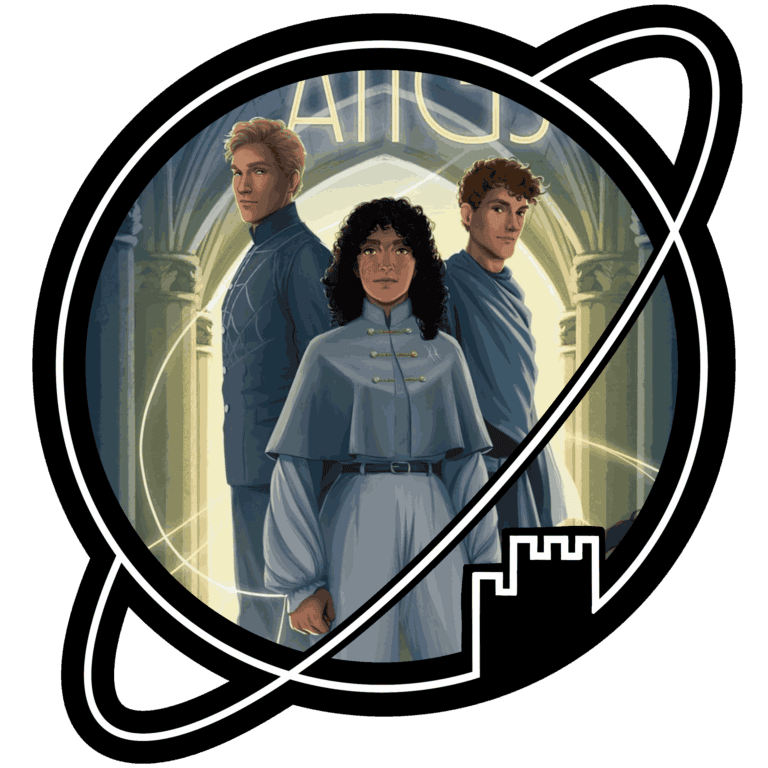

I don’t read a lot of (read: any) Dutch Fantasy. I picked up Web van Angst (Web of Fear) because it was written by Arlette Krijgsman, a member of Het Papieren Zwaard. HPZ strives to encourage and promote Dutch Fantasy. I’ve read some of their story bundles, and they feature really good Dutch Fantasy stories. So when I heard Arlette had her book traditionally published after winning a writing competition, I obviously had to pick it up.
Web van Angst is a Young Adult novel, which is clear in some ways, but I would say it exceeds the age bracket in others. The cover features stunning art by Tara Spruit, in a style that does seem more geared towards younger readers, featuring the three main characters facing the front (though there’s plenty of downright cartoonish covers hiding extremely smutty adult books these days – so I guess you really can’t judge a book by its cover). The writing style is very accessible as well, and while the book deals with heavy topics, they are handled in a very respectful way.
The story itself is an exploration of such a heavy topic. In a world where fear turns into literal monsters, there’s lots of space to explore how we (should) handle fear and anxiety. The Daimons are hardly a subtle metaphor, but as a concept, they work really well, and I’m interested to see where Krijgsman takes the metaphor in the sequel(s).
The worldbuilding of Web van Angst is solid. There’s a lot going on, but it never becomes confusing. The characters are easy to relate to and feel very real. There’s definitely a lot still unsaid with regard to their backstories, but then the story isn’t over yet.
I’d definitely recommend Web van Angst if you speak Dutch and want to check out some Dutch Fantasy!
Tagged:
See also:
- Movie directed by Denis Villeneuve
- Based on Do Androids Dream of Electric Sheep by Philip K. Dick
- Starring Ryan Gosling, Ana de Armas, Harrison Ford, Sylvia Hoeks, Robin Wright, and others
- Released 6 October 2017
- Runtime: 163 minutes
- Sequel to Blade Runner

I don’t think its a secret that I am a big fan of Denis Villeneuve. I love how his sci-fi movies focus on slower scenes and visuals. I love how good the visual design is his movies. It is exactly what I want from sci-fi cinema: high production value, great visuals, ideas beyond the action.
It’s no different in Blade Runner 2049. I think picking Villeneuve to revive this 40-year-old-franchise was a great choice. His style fits with Ridley Scott’s original Blade Runner very well: the same slowness to it, the same focus on visuals.
I think the visuals of 2049 even improve upon the original. It might just be that filmmaking has come a long way since the 80s, but 2049 is just a little more polished. The establishing shots, the contrast between clean and clutter, the coloured lighting, the focus on the rain – everything seems just a little more refined.
Blade Runner 2049 does lose a lot of the weirdness that was in the original and replaces it with more gravity. But I don’t mind. I have always found the weirdness of the original Blade Runner a little off-putting – it was the one thing you hoped people could get over when you sat down with them to watch the movie. And a movie as good as Blade Runner 2049 is allowed to take itself a little seriously.
Like the original, 2049 asks the viewer what makes a character human and what separates them from the replicants, focusing not on empathy but on love and on memory. Interestingly, by introducing the memory-element, 2049 actually nods another of Dick’s stories, We Can Remember It For You Wholesale.
One area where 2049 loses out to the original is in moral ambiguity. There is more than enough in 2049 that the viewer can wonder about. But the original Blade Runner left it up to the viewer to decide who were the good guys and who were the bad guys, and it adds a layer of depth to that movie that 2049 (and even Dick’s original Do Androids Dream of Electric Sheep) is missing. In a way, 2049 is more traditional Hollywood that way: the actions scenes are action filled and you know who you’re supposed to root for.
So movie is not quite perfect – I don’t like Jared Leto’s performance (I didn’t find his gravity credible), I am not a huge fan of K and Deckard’s fist fight and I think the water action sequence at the end is a little too long. I wonder whether the android revolution theme introduced in 2049 is the right hook for a sequel. But those are minor points in a movie that also has shots that take your breath away, and character moments that wrench your heart.
I think Blade Runner 2049 is a great movie. It looks gorgeous and it oozes emotion, it has a coherent story with enough depth that it keeps you engaged, and it is paced at a leisurely cruise that allows you enough time to process it.
For me, Blade Runner 2049 showcases the perfect style for a big-budget Hollywood blockbuster. So free up an evening this week and join me on the Denis Villeneuve bandwagon!
Tagged:
See also:
- Movie directed by Ridley Scott
- Based on Do Androids Dream of Electric Sheep by Philip K. Dick
- Starring Harrison Ford, Rutger Hauer, Sean Young, and Edward James Olmos
- Released 25 June 1982
- Runtime: 117 minutes
- Followed by Blade Runner 2049

Blade Runner is undeniably one of the most influential films in sci-fi. Arguably, it is one of the two pieces of media (alongside Neuromancer) that launched cyberpunk as a genre. It is praised into high heaven by Reddit nerds and successful directors alike.
That begs the question: is it any good?
I would argue that it is, but if you disagree, I can’t really fault you.
Blade Runner is a surprisingly slow and surprisingly weird movie to have gained such prominence. For a movie supposedly about a bounty hunter tracking down his targets, it defies expectations by focusing on visuals and conversations basically all the way until the last sequence between Deckard and his final prey. That final action scene is a series of quick bursts of action interspersed with dialogue and tension – and the rare action sequences we do get before that are more confusing and crowded than exciting.
‘Confusing and crowded’ is actually also a good way to describe Blade Runner’s visual style. The screen is constantly filled with clutter, be it on the crowded streets or in Deckard’s apartment. In many of those scenes, I would find myself trying to figure out where to look, constantly a little distracted from the scene’s focus by all the other things going on in the background – if Scott doesn’t explicitly place those ‘things in the background’ center shot.
But that slowness and weirdness is likely also why Blade Runner still hits home after more than 40 years. It was never intended as flashy and clean, and so it didn’t age half as poorly as a more conventional version of the story might have.
And so Blade Runner takes the time to develop Deckard’s relationship with Rachael and to showcase Sebastian’s dusty apartment full of mechanical marionets. And in doing so, it raises interesting questions: How does one distinguish between a human and a machine? What essential quality separates them?
Those are questions that are not dissimilar to those Dick asked in Do Androids Dream of Electric Sheep, though in Dick’s version of the story it is never in doubt that empathy is that quality. Blade Runner is an adaptation that takes some liberty, but I don’t mind the ambiguity Scott introduced. A movie has less space to delve into diverse themes than a novel. Scott chose to focus on one of them, and to leave the viewer more space to come to their own conclusions.
So I like Blade Runner, but I do think it might put some people off. Still, it is such a classic – why not give it a shot?
Tagged:
See also:

Review: All That We See or Seem – Ken Liu
Julia Z is a privacy-minded young woman with a history. She is also a a hacker and really good at her job. When a man shows up at her doorstep to ask her help in finding his abducted wife, she is forced to leave her life of carefully constructed quiet obscurity behind her to find a dream-weaving artist that dreamt with the wrong man.

Review: The Island of Doctor Moreau – H.G. Wells
Edward Prendick is shipwrecked and ends up on an island where he is taken in by the famous Dr Moreau and his assistant Montgomery. Prendick soon finds the island is inhabited by a whole host of human-animal hybrids. Can it be that the famous physician Moreau built these creatures – and must Prendick fear that he will be the subject of Moreau’s next experiment?
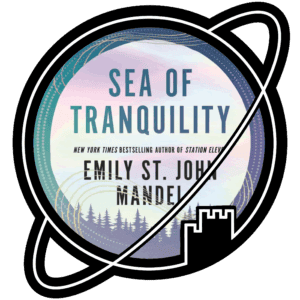
Review: Sea of Tranquility – Emily St. John Mandel
An early 20th century minor noble is exiled to Canada for his progressive ideas. A woman in the 2020s is trying to find out what happend tot an old friend. A writer in the 2200s is struggling to balance family life with a book tour. A detective in the 2400s is trying to resolve an anomaly in time that ties their stories together.

Review: Web van Angst – Arlette Krijgsman
In the city-state of Agathon, citizens must take a daily drug called peras to suppress their fear. This is vital because the fears of the inhabitants of Agathon manifest as Daimons: shadow monsters that can only be controlled by “Apaten”. At the prestigious Ataraxia Academy, Clara is training to become an Apaat, until one night she and her friends find themselves in the wrong place at the wrong time, and her whole world is turned upside down.

Review: Blade Runner 2049 – Denis Villeneuve
In 2049, androids have replaced humans as blade runners – androids are now hunting their own kind. When K is sent to retire a particular android, a peculiar find under the roots of dead tree sets him on the trail of something equally impossible and dangerous: an android that was born. Over the course of his investigation, he finds out about his own origins as well.

Review: Blade Runner – Ridley Scott
Rick Deckard is a blade runner, a bounty hunter tasked with seeking out – and taking out – rogue androids who have infiltrated society. When he is faced with a particularly dangerous group of the newest models, his conscience starts troubling him when he begins having difficulty telling them apart from humans.











